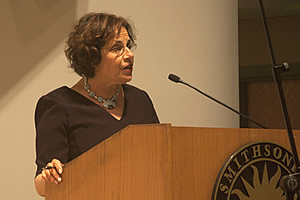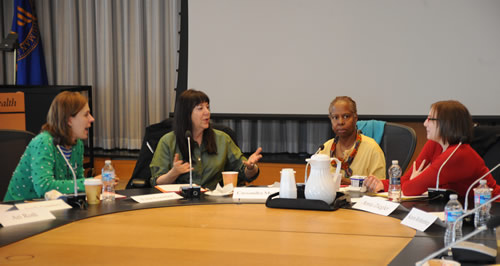Last updated: April 30, 2014
NHGRI workshop spotlights the connection between genomics and theater
NHGRI workshop spotlights the connection between genomics and theater
By Raymond MacDougall
Associate Director of Communications, Division of Intramural Research
 |
The Drama of DNA: Theater and Genomics Workshop was part of an initiative led by Karen Rothenberg, J.D., M.P.A., to explore theater as a way to examine the ethical, legal and social implications of genomics. Rothenberg is the senior advisor on genomics and society to NHGRI Director Eric D. Green, M.D., Ph.D.
At the workshop, participants heard about real-life case studies involving ethical dilemmas and family drama. Sara Hull, Ph.D., director of the NHGRI Bioethics Core, described a research project in which a father, who carried the gene mutation associated with a very high risk for breast and ovarian cancer, chose not to tell his daughters of their potential risk for the disease. NIH researchers requested an ethics consult because they felt torn between a parent's rights and those of his children, and wondered whether they were morally obligated to persuade him to share the information.
"Families are full of drama," Dr. Hull said. "At their best, they're nurturing and caring-great places to grow up and come home to. But it's not all good. They lie to each other and keep secrets from each other. They pass along their bad habits and their bad genes to their children-and they blame each other for that."
Among the 15 playwrights were local theater professionals associated with Arena Stage and Theater J. in Washington, D.C.; and the theater department at Montgomery College in Rockville, Md., One of the attendees was Joshua Ford, a playwright affiliated with Theater J through its Locally Grown Initiative.
"I tend to write about history and am always interested in science as a theme," said Mr. Ford. He is currently exploring the dramatic possibilities associated with the life of Fritz Haber, recipient of the 1918 Nobel Prize in chemistry. A controversial figure, Haber was credited with a process for synthesizing ammonia from its elements used both for fertilizer (food production) and explosives.
"I love contradictions in people," Ford said. "Those are stories that I'm interested in telling, the stuff that grabs me. I'm really interested in hearing the case studies and narratives because you never really know what you might hear that you can use."
William Gahl, M.D., Ph.D., director of the NIH Undiagnosed Diseases Program (UDP), told about a patient whose complex and undiagnosed disorder had been studied at NIH. She developed an unrelated condition, which became serious after local doctors didn't treat it quickly enough. The story illustrated how undiagnosed patients face prejudice-even from their doctors-because of their undiagnosed conditions. "They lose some credibility because they can't put a name on their disease," he said.
James Evans, M.D., Ph.D., Bryson Distinguished Professor of Genetics and Medicine at the University of North Carolina School of Medicine at Chapel Hill, described a genetic counselling session with a patient whose family members carried a gene mutation that meant they had a very high risk for early-onset Alzheimer's disease.
"She was really grappling with this," Dr. Evans said, describing her dilemma to seek genetic testing herself. "The pros and the cons for her were much different than they would be for someone else."
"Common to all the narratives is the fact that genetics and genomics are all about family and relationships," Ms. Rothenberg observed. "There's so much richness. If there were more plays that explored these dilemmas, it might encourage these conversations in families. With the increase in genetic testing and genomic sequencing, wouldn't it be great for theater to help audiences explore whether they would want to know a genetic test result-and share it with their family?"
"Theater has a long history of addressing social, political and cultural issues," said Jacqueline Lawton, a Washington, D.C.-based playwright. "The sciences - especially the intricate, rich, deeply personal and ethical complexities of genomics and genetics - have an enormous impact on our daily lives. When theater artists and scientists work together, we can help break down the barriers that exist between scientists and the public. We can encourage learning and curiosity."
After the workshop, many of the participants moved from the NIH campus in Bethesda, Md., to the Smithsonian's S. Dillon Ripley Center in Washington, D.C., to take in scenes from four plays and to discuss the illustrated ethical and societal implications. The evening performance was organized in conjunction with the Smithsonian Institution's National Museum of Natural History-NHGRI exhibition, Genome: Unlocking Life's Code.
The scenes were written by acclaimed playwrights, who participated in the morning workshop, including:
 |
- Anna Ziegler, author of Photograph 51, a play that explores sexism, ethics and scientific collaboration in the discovery of the structure of the DNA molecule. Scientist Rosalind Franklin paved the way for that discovery with her x-ray crystallography of DNA's helical structure.
- Cassandra Medley's play, Relativity, about melanin, DNA and family.
- Lisa Loomer's play, Distracted, focused on attention deficit hyperactivity disorder diagnosis and treatment.
- Dorothy Fortenberry, Good Egg, in which a woman struggles over fertility questions.
"I am gratified by the level of enthusiasm and collaboration among these communities," Ms. Rothenberg said. "Scientists and artists are both looking for ways to enhance the public's understanding of science within society." NHGRI Director Green encouraged the participating playwrights to reach out to institute scientists, which has already begun to happen.
Over the past five years, Ms. Rothenberg has used original plays and scenes from existing dramas to generate discussions at policy sessions, professional meetings and conferences. She coauthored The Drama of DNA, just published by Oxford University Press, with colleague Lynn Bush, Ph.D., M.S., faculty associate at the Center for Bioethics at Columbia University.
Posted: April 30, 2014
